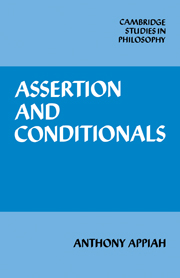7 - Assertion
Published online by Cambridge University Press: 07 October 2011
Summary
The truthful speaker wants not to assert falsehoods, wherefore he is willing only to assert what he takes to very probably true.
(Lewis, 1976: 297)OVERVIEW
In Part I of this book I was concerned almost exclusively with minds. The last chapter was concerned very largely with language and relatively little with mind. In this chapter I want to give my own view of assertion, a view which connects language and mind. I want to show how, given our theory of the nature of beliefs, it is relatively easy to give an account of declarative meaning. This task will seem to some of our contemporary anti-psychologists – such components of ‘psychologism’ in semantics as Dummett (1973: passim) – absurd. It is not possible, they have held, to carry out this project because, in Davidson's (1975) words, ‘without speech … we cannot make … fine distinctions between thoughts’. My project, from this point of view, is circular. For I assume that we can ascribe beliefs and then go on to say what terms in the agent's language mean; whereas they hold that I need meanings to ascribe the beliefs.
Let me mention three reasons why I have ignored their position here. First, and importantly, I can simply admit some of what Davidson is claiming.
Information
- Type
- Chapter
- Information
- Assertion and Conditionals , pp. 143 - 158Publisher: Cambridge University PressPrint publication year: 1985
